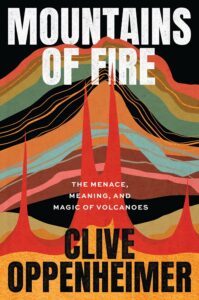Mountains of Fire: The Menace, Meaning, and Magic of Volcanoes – Clive Oppenheimer
 Mountains of Fire: The Menace, Meaning, and Magic of Volcanoes. By Clive Oppenheimer. (Chicago: The University of Chicago Press, 2023. pp. 357. Cloth, $27.50.)
Mountains of Fire: The Menace, Meaning, and Magic of Volcanoes. By Clive Oppenheimer. (Chicago: The University of Chicago Press, 2023. pp. 357. Cloth, $27.50.)
Sometimes, when I want to take a break from history or academic writing, I read works of popular science. To me, volcanoes are fascinating, but I know almost nothing about them. So I picked up this book looking for easy to understand information about volcanoes and their history. Unfortunately, at the end of the book I felt like I knew the same amount about volcanoes as when I picked it up.
A lot of books in this genre are intimately intertwined with the author’s own scientific journey, from how they discovered the subject to where study of that subject has led them. In the case of Mountains of Fire, that means a physical journey around the world as Oppenheimer details where his experimentation took him. As such, this reads as more of an adventure story than one of popular science. He goes to some pretty interesting places, like North Korea and the Antarctic. I had no idea there were volcanoes in either of those places, and I found Oppenheimer’s visits there to be very interesting. As he says of his visit to volcanologists in North Korea and their inability to communicate and collaborate with the rest of the international scientific community “made me realise how science can suffer in seclusion” (134-135).
What I walked away from was the physical difficulties Oppenheimer encountered when attempting to study various volcanoes. He details difficulties in scaling them, difficulties in keeping adequate provisions, difficulties staying warm, difficulties in staying cool, difficulties of conducting science in a warzone, difficulties setting up camps and research stations where the volcano wouldn’t lop globs of lava onto their campsites. He also goes into details about the process of obtaining permission to visit certain sites, most notably in Africa, where he ran into human danger as well as volcanic ones.
This is an adventure story more than a scientific or historical one. As such, I walked away with a feeling of disappointment. If you want to read about what goes into studying volcanoes but not necessarily their history or the outcome of some experiments, this is the book for you. Unfortunately it wasn’t really what I was looking for. The Lost City of Z by David Grann is a good example of adventure writing in the present and in the past (though it is about archeology and not science). If you are looking for a book in this genre, that is the one I would recommend to you.
